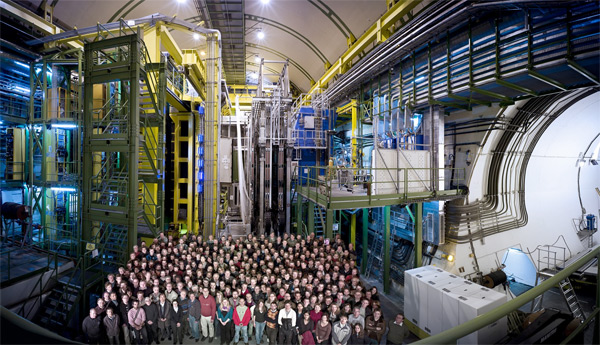
LHCb is an experiment set up to explore what happened after the Big Bang that allowed matter to survive and build the Universe we inhabit today
Fourteen billion years ago, the Universe began with a bang. Crammed within an infinitely small space, energy coalesced to form equal quantities of matter and antimatter. But as the Universe cooled and expanded, its composition changed. Just one second after the Big Bang, antimatter had all but disappeared, leaving matter to form everything that we see around us — from the stars and galaxies, to the Earth and all life that it supports.
-
LHCb releases service to access Run II data
The LHCb collaboration is happy to announce the official release of the LHCb Ntupling Service: a web service for on-demand production and publishing of custom LHCb open data. This provides the public access to both Run I, and for the first time, Run II pp data collected by LHCb. This amounts to over 4 PB…
-
Chasing top quarks and Higgs bosons with Artificial Intelligence
Recently the LHCb collaboration published two papers reporting the use of Artificial Intelligence (AI) in the study of top quark and Higgs boson production. The use of AI allowed LHCb physicists to study top and Higgs decays into lighter quarks. Quarks are not observed directly in particle detectors; instead they fragment into collimated sprays (called…
-
End of the PbPb run and the 2025 run
One week ago the LHC dumped the beams for the last time this year, bringing the heavy ion run to an end. During this campaign, LHCb collected 0.86 nb⁻¹ of PbPb collisions, almost double the sample collected last year, thanks to improvements such as the enhanced β* = 1m optics. At the same time, the…
-
Precision measurements of CKM angle γ, charm mixing and CP violation
Today, at the CERN seminar, the LHCb collaboration reported an improved determination of the CKM angle γ with a precision of 2.6°. This result was obtained by a simultaneous combination of measurements sensitive to the CP-violating angle γ of the Cabibbo-Kobayashi-Maskawa (CKM) unitarity triangle, to the charm parameters describing oscillations (mixing) between D0 and D0…
-
End of the 2025 proton-proton collision run
The proton–proton (pp) data-taking period for 2025 has just come to an end. Thanks to the commitment and expertise of members of the LHCb collaboration, the outstanding performance achieved throughout the entire pp run has been made possible. LHCb has successfully collected 11.8 fb-1 of high-quality pp data. The image on the left below shows…
-
The LHCb collaboration turns 30!
In August 1995 a Letter of Intent was submitted for the LHCb experiment, the world’s first dedicated B-physics experiment exploiting the unique potential of high-energy hadron-hadron collisions. This year, the LHCb collaboration has marked the 30th anniversary of this event. Click the cartoon (by Adrien Miqueu) for a higher-resolution version. The bound state of a…
